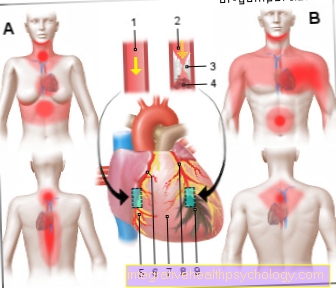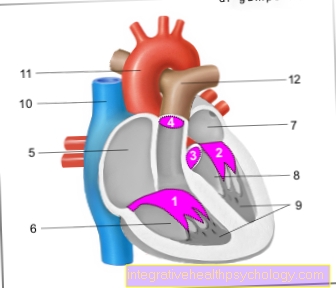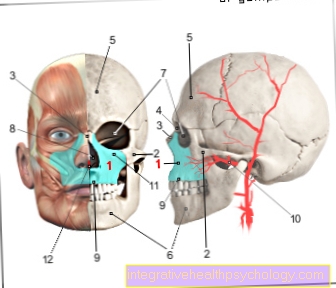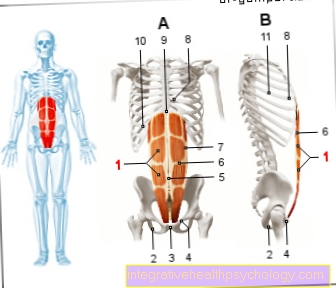Reading weaknesses
What is a reading and spelling disorder?
Reading and spelling disorder, also known as reading and spelling disorder, reading and spelling difficulties and dyslexia, is a very pronounced, long-lasting disorder in learning the written language or written language.
This means that people have difficulty writing down the spoken language and reading the written language aloud.
It is assumed that around 4% of students in Germany have a reading and spelling weakness.

How can you recognize a reading and writing problem?
A reading and spelling disorder (Dyslexia) can be recognized by the fact that the persons concerned in written work (Texts or dictations) make a lot of mistakes. The children write words in different variations and are unable to find the correct spelling on their own.
They cannot apply their knowledge or do not know the solution aids. As a result, children with dyslexia advise a lot and just start writing.
One can suspect a reading and spelling weakness when children write much too hastily and forget letters or whole words, or write conspicuously slowly and take significantly longer than the other children.
A noticeable sign of a weakness in reading spelling is a clear avoidance behavior of those affected. The children try to avoid writing or reading aloud in school. In addition, children with dyslexia often become anxious at the announcement of a school dictation and are very worried about failure.
Are you more interested in this topic? You can read more detailed information about this in the following article: Early detection of dyslexia
Other symptoms of poor reading spelling
Children who learn to read and write make a lot of mistakes in the beginning. However, children who suffer from dyslexia make the mistakes much more often and over a longer period of time than other children.
When reading, signs may be that the child reads very slowly, often stops, loses a line in the text or skips a line. It also occasionally swaps words, syllables or letters or adds them incorrectly.
Those affected have problems understanding what they have read in terms of its meaning and reproducing it in their own words. When writing, typical signs are that children make an enormous number of mistakes in dictations and texts. So they write words partially fragmentarily and incorrectly several times in the same text.
There are also many errors in grammar and punctuation, poorly legible handwriting and different font sizes within a text or even a line.
Unfortunately, a reading and spelling weakness often leads to failure in various school subjects. Children can fail in school subjects, although they would actually be gifted in the subject, but cannot develop due to their dyslexia.
Failures and fears of failure can cause enormous stress, so that the affected children become aggressive and sad in their behavior and often develop fear of school or psychosomatic complaints such as abdominal pain and nausea.
Are you interested in this topic? Then read our next article below: Symptoms of dyslexia
How is reading and writing difficulties treated?
A reading and spelling weakness should be treated as early as possible. This helps those affected enormously in their development and can enable the children to have a normal school life.
It is important that parents and teachers approach the children with a lot of patience and understanding.
Dyslexia exercises
There are various exercises for reading and writing difficulties on the Internet or in books. There are various worksheets that contain exercises. For example, for visual differentiation. It is trained that the children recognize letters, syllables and words better.
Optical memory exercises promote the recognition of pictures, letters and words. These exercises are playful like memori.
There are also exercises for acoustic differentiation and acoustic memory. These tasks should help to better understand the differences between “bull” and “stir” or “fall” and “pale”.
There are many child-friendly exercises. For example, an acoustic differentiation exercise might have different pictures on a worksheet, of animals, clothes, a house, torch, etc., and ask the children to speak the pictures once and then number them alphabetically. In this way, the children practice playfully and at best have a lot of fun with the exercises for dyslexia.
Dyslexia educational games
There are various reading-spelling games / software on the Internet with which children can playfully work on their reading-spelling problems. These include games like memori with words and pictures, syllable mahjong, stumbling blocks, vowel squares or a maze with words.
There are various games for children of all ages that playfully arouse an interest in letters or words. Depending on the age and interests of the child, there are suitable games to practice with for every taste.
There are also real “tangible” games to practice with a reading and spelling weakness, with blocks, dice, wooden letters or letter stamps. Educational games are a great way to stimulate the children and develop joy in learning.
What other therapy options are there for reading and spelling difficulties? For more detailed information, see: Therapy of dyslexia
What is the prognosis?
A reading and spelling weakness cannot be prevented, but it can be treated well. It is important that dyslexia is treated as early as possible. This can significantly reduce the deficits compared to non-dyslexics.
Treating dyslexia early can reduce the children's mental difficulties. Children with a reading and spelling disorder develop fear of failure and school anxiety at an early age and are prone to depressive moods and psychosomatic complaints.
Early therapy can in many cases prevent such serious complications and help children develop healthily. As a result, the timing of treatment determines the prognosis, and starting therapy early usually leads to a very good prognosis.
What are the underlying causes of poor reading spelling?
The causes of dyslexia are not fully understood, but it seems to be a disorder in which many factors play a role.
Genetic predisposition plays an important role in reading and writing difficulties. If one parent suffers from dyslexia, the probability for the child is about 60-70% of being affected by a reading and spelling disorder.
Other causes are disorders of central auditory perception and central visual perception, disorders of learning and auditory memory and influencing factors such as early childhood brain damage, motor development delay, neuroses of the parents, insufficient parental support, separation or divorce of the parents or unresolved conflicts as well as a low socio-economic status.
A disorder of the central auditory perception means that in dyslexia the ability to hear sounds (spoken language) and to store them in memory.
If the central visual perception is disturbed, those affected react much more slowly, especially when reading, and letter / word information is processed less effectively in the brain.
The term "disorders of learning and auditory memory" describes that the reading and spelling disorder is a learning disorder. Those affected have difficulty remembering words or sounds.
In summary, some different causes of poor reading spelling are assumed that are neurobiologically oriented.
You can read more detailed information on this topic at: Causes of Dyslexia
Which tests can diagnose poor reading spelling?
There is currently no direct, standardized test for dyslexia. However, there are various ways of performing a test or an examination for reading and spelling weaknesses, or LRS test for short.
A dyslexia test usually includes spelling tests, reading tests, and intelligence tests, and a full interview with the child's parents.
The spelling ability is examined using a standardized spelling test, the test names are WRT, DRT and HSP. Reading ability is also examined with a standardized reading test, namely with the ZLT-II or SLRT-II test. Intelligence tests for children are HAWIK, CFT and K-ABC.
In order to find out whether the affected children suffer from psychological factors such as fear of school or whether the reading and spelling weakness is simply due to difficulties in attentiveness, further tests are often carried out in child and adolescent psychiatry.
This includes examining the child's mental health and attention and concentration. Clinical tests that examine psychological well-being are DTK, AFS and “Animals in Pictures”. Attention and concentration can, however, be examined using the TAP test and a detailed doctor-patient discussion.
The tests should be carried out by an experienced child and adolescent psychiatrist. This can possibly diagnose further difficulties and psychological abnormalities and help the affected child.
Are you more interested in this topic? Read our next article below: Diagnosis of dyslexia
Reading and writing difficulties in adults
There are numerous adults with poor reading spelling who have difficulty writing or reading properly. People who are not recognized and treated as dyslexic in childhood often develop tricks not to attract attention and not to have to write.
Unfortunately, one does not grow out of the weakness in reading, the difficulties only change. Adults with dyslexia often write many things correctly, but do not see for themselves what is right and what is wrong.
With age, the shame increases and adult dyslexics are dependent on others for many things, contracts etc. However, dyslexia is nothing to be ashamed of, neither in childhood nor in adulthood. With the right treatment for dyslexia, you can still learn and improve a lot in adulthood.
What consequences does a reading and spelling weakness have for the assessment in school?
In principle, children and teenagers with dyslexia are entitled to compensation for disadvantages in the school ratings. This corresponds to the principle of school inclusion. The prerequisite for this is that the reading and spelling weaknesses are recognized. Only then can you promote dyslexia and provide targeted help to the students.
Dyslexics are entitled to school disadvantage compensation and grade protection. This includes, for example, that (bad) Spelling skills do not have a negative effect on exam results.
This means that children and young people have a fairer performance assessment and the opportunity to develop their talents in a wide variety of school subjects despite their impairment.
This topic could also be of interest to you: Learning Problems - What to Do?
Reading and spelling weaknesses in combination with a weakness in numeracy
It is not uncommon for reading and spelling weaknesses and arithmetic weaknesses, also known as dyscalculia, to occur together.
Dyslexia is based on difficulties in verbal-phonological processing in the brain, while arithmetic weaknesses are based on impaired basic numerical processing in the brain. This means that there are difficulties in the perception area in both learning disorders.
How it comes that the disturbances occur together is still unclear. However, you have to know that the learning disorders do not go away on their own or grow together with age.
In order to alleviate the weaknesses in reading and writing and arithmetic, the affected children need special training and a lot of patience and understanding from their parents and teachers. You should plan a learning therapy with the school and, if necessary, a psychologist and consider whether the learning disorders are treated simultaneously or one after the other and what special help the child concerned needs.
You can read more detailed information on this topic: Therapy of dyscalculia
Recommendation from the editor
Further general information on the subject of "reading and spelling weaknesses":
- Dyslexia - LRS
- Early detection of dyslexia
- Diagnosis of dyscalculia
















.jpg)












